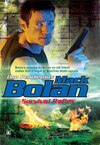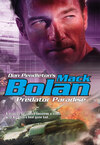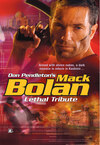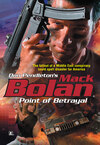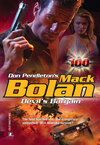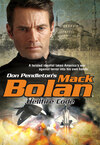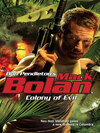Kitabı oku: «Survival Reflex», sayfa 3
Some people were natural victims, defeated by life and timid to a fault. They seemed to lurch from one disaster to the next, recognized by bullies on sight. Others were strong and confident, broadcasting an alert that told potential hunters any confrontation might prove hazardous.
Belém’s slum dwellers noticed Bolan as he made his way across their turf, but no one tried to intercept him. Even if he hadn’t been a clear-cut Alpha male, the fact that he was trailing heat had registered before he covered half a block.
Both trackers from the black American sedan came after him on foot. It was their first mistake, and Bolan meant to save them the embarrassment of making any more. He led them three blocks deeper into hostile territory, then picked out an alley that was well-shadowed despite the midday hour. Turning in, he ducked behind the nearest garbage bin and stood back to wait.
The stalkers followed him, then passed him by. One of them started to say something, but his partner shushed him. “Quiet now, and watch your step,” he said.
“Too late,” Bolan advised.
THEY TURNED as one, to find him standing in the middle of the alley, blocking off their access to the street.
“What’s this?” the seeming leader asked him.
“You tell me,” Bolan replied.
“I don’t know you from Adam, pal.”
“Which makes me wonder why you’re tailing me,” Bolan said, standing fast.
The leader’s ruddy cheeks flushed darker still. Apparently his brief didn’t include a face-to-face with Bolan, even though they clearly meant to spook him out of town.
“You must have us mixed up with someone else,” he said.
“Convince me.”
“How would I do that?”
“You could show me some ID,” Bolan suggested. “Maybe tell me why you’ve been tailgating me since I left the hotel.”
The second spook had worked up nerve enough to speak. He said, “Hey, now!” before his partner cut him off.
“You’ve got some nerve,” the leader said. “I’ll give you that.”
“Your boss left that part out when he was briefing you, I guess,” Bolan replied.
“My boss?”
“Downey.”
The two men blinked as one. “I don’t know anybody by that name,” the leader said, too late.
“So, he won’t miss you, then.”
“Miss who?” The second spook had trouble keeping pace.
“We’re going now,” the leader said. “Have a nice day.”
“I don’t think so.”
They telegraphed the rush with sidelong glances, back and forth. Not certain what to do, now that their crude surveillance had backfired, the pair surrendered to machismo. Bolan saw it coming and was ready when it got there.
Number one, the mouthpiece, led his partner by six feet or so, looking to tackle Bolan, taking him down and maybe thumping him for a while before he tired of it and left.
It didn’t quite work out that way.
The Executioner dropped to a fighting crouch at the last second, while his adversary’s thick arms closed on empty air. He fired a rabbit punch into the spook’s short ribs and heard him grunt with pain as he was doubling over. No time to evaluate the damage as he drove a rising knee into the stranger’s nose and flattened it across his florid face.
The leader dropped to hands and knees, while Bolan turned to face his sidekick. Number two was growling as he sprang toward Bolan, one arm cocked to throw a mighty haymaker. If it had landed, Bolan would’ve been in trouble, but he ducked the punch instead, seized the extended arm and used his enemy’s momentum as a weapon, flinging him to earth.
The spook went down, then came up cursing, red-faced, instantly forgetting most of what his martial-arts instructor would’ve taught him during basic training. What he tried and failed to execute was a high kick toward Bolan’s face.
Bad move.
It was a simple thing to block the kick and grab his ankle, twist it sharply, and kick through the knee of his remaining leg where it supported him. This time, when he went down, the spook was squealing in pain.
Bolan turned back to number one and found him struggling to his feet, blood streaming from his broken nose to stain his white dress shirt.
“Bathtid,” he growled. “Ahm gawn kitchur ath.”
Bolan feinted a swing, then caught him with a roundhouse kick behind one ear. The guy went down, poleaxed, and hit the ground this time without a whimper.
Leaving one.
His backup had rolled to the garbage bin, clutching one rusty side as he struggled to drag himself upright. It was painful to watch, and he was wasting precious time.
Bolan chose his spot, the base of the skull, and aimed his elbow shot for maximum effect without the killer follow-through. It dropped his man, inert, and he was pure deadweight as Bolan hoisted him into the bin. Moments later, when the two spooks lay together on a bed of reeking garbage, Bolan dropped the bin’s lid and left them to their troubled dreams.
Sleep tight.
Don’t let the slum rats bite.
No one appeared to notice Bolan as he walked back to his car. He found it at the curb, untouched, and saw the black American sedan parked on the far side of the street. It might still be there when the two spooks woke and crawled out of the garbage bin.
Then again, it might not be.
Too bad.
Still watching out for tails, he joined the flow of traffic and set off to see a man about some combat gear.
THE DEALER’S SHOP was half a mile from where Bolan had left his two incompetent shadows. Out front, bilingual signs offered repair of watches, small appliances and such. Inside, a man of middle age was hunched over a cluttered workbench, peering at the guts of an electric motor through a jeweler’s loupe. He glanced up as a cow bell clanked to signal Bolan’s entry and set down his screwdriver.
“Boa tarde, Senhor.”
“Fala inglês?” Bolan asked, thus exhausting his Portuguese vocabulary.
“English, yes, I speak. How may I help you?” Bolan spoke the phrase Blancanales had provided, watching as the merchant’s face registered first surprise, then caution.
“Ah. You wish to see my special stock?”
“That’s right,” Bolan confirmed.”
“One moment, please.”
The shopkeeper rose from his stool and limped past Bolan to the door, which he locked while reversing a small cardboard sign.
“Is siesta time now,” he explained with a smile. “You will please follow me.”
Bolan trailed him through a curtained doorway to a tiny, cluttered storeroom, where another door opened on steep wooden stairs. The proprietor descended first, taking the stairs without complaint despite his limp. Bolan followed into another storeroom, this one spotless and smelling of gun oil.
Bolan could’ve launched a small war with the dealer’s inventory, but he had no plans to mount a grand offensive. He passed on the heavy machine guns, rocket and grenade launchers, and the Barrett M-82 A-1 Light Fifty sniper rifle. In their place, he chose a Steyr AUG assault rifle, a Beretta 92-F semiauto pistol and a Ka-Bar combat knife. Spare magazines and ammunition, with a side order of frag grenades, completed his heavy-metal shopping list. The rest came down to camouflage fatigues, web gear, an Alice pack and shoulder rig for the Beretta, two canteens and sturdy hiking boots. The purchases filled two stout duffel bags and took a fair bite out of Bolan’s bankroll, but he didn’t quibble over price.
The money, strictly speaking, wasn’t even his.
Before leaving the States, he’d tapped a San Diego crack dealer for sixty thousand dollars and some pocket change. Six different banks had sold him nine grand worth of AmEx traveler’s checks, and thus avoided mandatory red flags to the IRS. The rest had funded Bolan’s flights, the rented car and his unused hotel room where his bag and civvies were waiting to be seized by someone from the Company.
He hoped the clothes turned out to be a lousy fit.
Before packing the gear, he loaded the Beretta and two spare magazines, adjusted the quick-draw harness to fit his torso, and covered the setup with his windbreaker. The waning day outside was cool enough, here on the coast, to prevent him from standing out by the jacket alone. After he cleared Cuiabá, farther in-country, concealment of his weapons would no longer be an issue.
Climbing the stairs behind the shop owner, Bolan slung one bag over his left shoulder and carried its mate in his left hand, leaving the right free for action if need be. He didn’t anticipate trouble this early, but in most cases preparedness was more than half the battle.
Exiting the shop, he paused to scan the street in both directions, but aside from the neighborhood pusher, he saw no one who qualified as suspicious. Bolan walked back to his car and stowed both bags in the trunk, satisfied with the pistol for now. He would bag it, as well, when the time came to fly, but he still had hours to burn in Belém before his crack-of-dawn rendezvous with a charter pilot who asked no impertinent questions where payment in cash was concerned.
Bolan used an hour of that time to scout the airstrip, studying the hangar and its layout on the drive-by. He would return before dawn to check it again, watching closely for any lurkers in the shadows, but he retained an air of cautious optimism.
So far, so good.
And if experience was any guide, his chosen road could only go downhill from here.
Belém isn’t Rio, but Bolan had no problem getting lost in the crowd, alternately driving and walking, never straying far enough from the rental to put his new hardware at risk from light-fingered locals. Staying awake through the night was no challenge. Call it a familiar ritual, divorced in Bolan’s mind from any concept of fatigue.
He could sleep in the air, on the long flight westward to Cuiabá. And after that—who knew?
In the grand scheme of things, feeling weary was the least of a combat soldier’s problems. In the days ahead, Bolan expected to be faced with worse.
All for the sake of friendship.
For the sake of duty.
And to find out what in Hell was going on with Nathan Weiss.
CHAPTER FOUR
The pilot was a twenty-something woman with short red hair and a black patch covering her left eye. The one Bolan could see was emerald-green and flicked suspiciously in the direction of his duffel bags before he loaded them aboard a Piper PA15 Vagabond at least a decade older than its owner.
Whatever she was thinking, cash resolved the lady’s doubts about her passenger, and they were in the air by 6:15 a.m., soaring southwestward over rain forest that could’ve swallowed regiments with ample room to spare.
Where are you, Bones? he thought. What brought you here?
Bolan was glad to get out of Belém and out from under scrutiny, at least for the time being. He had no illusions about pulling off a long-term fade, if agents of the CIA made any serious attempt to locate him. They’d find him in Cuiabá, given time, but Bolan didn’t plan to hang around to see the sights.
If they pursued him on his mission through the jungle, it would be another story. They would be on his turf, then, and nothing in their past experience would’ve prepared them for a contest with the Executioner.
The weak part of his plan was still Marta Enriquez. Spooks had followed her to San Diego, where they’d picked up Bolan’s trail without him noticing. That was a personal embarrassment, but he could live with it. The extra bad news was that if they’d spotted him, they also had to have marked Pol Blancanales, which, in turn, might lead them back to Able Team and Stony Man, if they dug deep enough.
Granted, the Company had been aware of Stony Man from the beginning, and a team of Langley rogues had once attempted to destroy the Blue Ridge Mountain farm, but general knowledge and specific details were two very different things. Bolan was on a private errand in Brazil, albeit with the knowledge of his old friend Hal Brognola, who ran Stony Man from Washington. What Bolan hadn’t known, before he left the States, was that his mission placed him in direct conflict with agents of the CIA.
That was the kind of problem that could boomerang on Brognola in nothing flat, and friendship demanded that he warn Brognola at the very least.
And if the big Fed tried to call him off, then what?
He couldn’t answer that until he reached Cuiabá. Enriquez was supposed to meet him there and help him with the next stage of his journey. If she didn’t show, or if a swarm of spooks was trailing her, he might be forced to scrub the play.
As for the risk that he might pose to Brognola and Stony Man by pushing on, Bolan would have to weigh that against his prevailing sense of duty to an even older friend.
Cruising over the primeval forest at 130 miles per hour, Bolan reviewed what he knew so far. Blaine Downey hadn’t mentioned Nathan Weiss at their brief meeting in Belém. Rather, he’d warned against collaborating with Marta Enriquez—but why?
Was the woman herself a target of investigation, distinct and separate from Weiss? It seemed unlikely, but Bolan had seen enough of politics in various banana republics to know that anything was possible.
Then again, if the Company was after Weiss, presumably acting in conjunction with the Brazilian government, what had Bones done to provoke their anger? Was it really just a matter of him helping persecuted aborigines, or was there something else at stake?
Bones was a healer. Even in the midst of war, he’d treated wounded soldiers of both sides impartially. His dedication was to mending flesh and lives, not scrutinizing racial pedigrees or weighing ideology. A man of peace, he’d volunteered to serve in combat, where he thought his skills were needed.
Most people found that kind of dedication laudable, until it trespassed on their politics. Healing our side was fine, of course, but hands off the alien-radical-subversive-demonic other side. Under no circumstances could healers help them.
Bones hadn’t toed that line in Asia, and the odds against him heeding it now were astronomical.
But had he tipped the other way at some point, in the years since Bolan saw him last? Had he abandoned his trademark impartiality to join some cause that placed him in the outlaw ranks?
And if so, what could Bolan do about it?
Nothing, Bolan thought.
Not if the doctor’s mind was set.
But he was flying on the wings of guesswork now, and that was reckless. He would wait to see if Marta met him in Cuiabá, if she had the means of putting him in touch with Nathan Weiss. And if she could, he’d find out what Bones had to say for himself.
Until then, the trick was just staying alive.
Belém
“YOU STINK, the two of you,” Blaine Downey said.
“Yes, sir. We came straight back,” Sutter replied. “I didn’t want to phone it in.”
“Straight back from where? The city dump?”
“Almost.”
“Explain yourself.”
“You ordered us to keep an eye on Cooper, sir, and follow him if he left the hotel.”
“There’s nothing wrong with my memory, Sutter.”
“No, sir. Anyway, he did leave the hotel, and we trailed him. Making it obvious, just like you said. He saw us, all right, started boxing the block to make sure, then he led us downtown. Parked on the outskirts of the red-light district.”
“Window shopping?” Downey asked.
“That’s what we thought,” Sutter replied. “We figured if he tried to score a little action, we could break it up and spoil his evening for him.”
“Fair enough. How does that bring us to your tragic choice of aftershave?”
“We followed him a couple blocks from where he parked, and then he ducked into an alley.”
“And?”
“We went in after him.”
“Of course you did.”
“First thing, I thought we’d lost him somehow. Maybe he ducked through a door we didn’t see or something. Then, before you know it, he’s behind us.”
Downey saw where this was going, but he let the flow of words continue.
“Anyway,” Sutter continued, “we had words.”
“Such as?”
“He challenged us,” Sutter said.
“Challenged us,” Jones echoed, speaking for the first time since he’d entered Downey’s office. “Right.”
“Who made the first move?” Downey asked.
“Well…”
That answered it.
Downey refused to let the two incompetents provoke a raging outburst, though the pair of them deserved no better. He preferred to take his time, dissect them with a surgeon’s skill, enjoying every slice.
For all the good that it would do him now.
“I see,” he said. “The target challenged you, and one or both of you attacked him. Did I order you to rough him up, Sutter?”
“You didn’t say—”
“Thank you. I’ll take that as a no. The two of you exceeded your instructions and then, what? He kicked your asses, I suppose?”
Jones fidgeted with eyes downcast. Sutter was fuming, anger radiating from his body like the stench of garbage that surrounded him, but he was wise enough to keep his mouth shut.
“Right,” Downey continued. “So, he kicked your asses for you. Knocked you both unconscious, I presume, since your report is hours late. And from the way you stink, I’d guess he dropped you down a manhole. Were you floating in the sewer all this time, ladies?”
Nothing.
“I can’t hear you.”
The crunching sound from Sutter had to be grinding teeth. His face was red enough to fit a stroke victim. Beside him, Jones reluctantly answered, “A garbage Dumpster, sir.”
“How’s that?”
“He put us in a Dumpster, sir, not down a manhole.”
“I’m relieved,” Downey said. “I don’t think that I could stand another load of shit from either one of you.”
“No, sir,” Jones answered.
“Will you shut up!” Sutter hissed.
“I’m gravely disappointed in the pair of you,” Downey announced. “You’ve turned a simple job into a screwup that’s left the Company exposed on levels you don’t even understand. You wouldn’t catch me lighting any candles if the mark had bled you out instead of marinating you in garbage. Are we clear?”
Apparently, since neither of the smelly two replied.
“My choices, broadly speaking, are to can your asses on the spot or to send you back to Langley for retraining and potential reassignment. That’s if I report your sorry asses for the mess you’ve made.”
“And if you don’t? Sir?” There was something close to hope in Sutter’s surly voice.
“You must redeem yourselves,” Downey said.
“How can we do that?”
“Begin by thinking for a change. What do you think might change my mood, right now?”
“Locate the mark!” Jones said, pleased with himself despite his reek.
“And…?”
“And…trace him to his contact?” Sutter asked.
“At which time,” Downey prodded, “you would…?”
That one stumped them for a moment, until Sutter hit upon the obvious. “We take ’em out,” he said. “Use locals if we can. No comebacks on the Company.”
“Be careful, gentlemen, and shower thoroughly before you start, for God’s sake. I’ll expect good news within…shall we say, forty-eight hours?”
“Yes, sir.” A two-man chorus.
“If you can’t manage that, I suggest you keep going. Find a hole and burrow deep. Pray I don’t find you alive.”
Cuiabá, Brazil
THE RED-HAIRED PILOT beat her own best ETA by forty minutes, even after bucking killer turbulence over the Serra Formosa. Bolan tipped her thirty percent of her fee and got an inkling of a smile in return before she left him to fuel the plane for her return trip to Belém.
When Bolan turned, hefting his bags, he saw Marta Enriquez standing in the shadow of the airstrip’s terminal. She raised a hand and Bolan nodded in return, while scanning left and right for any sign of watchers in the neighborhood. He’d missed them back in San Diego, and he was determined not to make the same mistake again.
This time around, his life depended on it.
Bolan crossed the tarmac and a strip of poorly tended grass to reach the terminal. He didn’t go inside, because the country’s rural landing strips demanded nothing in the way of customs declarations or security procedures. It was why he’d gone the charter route, instead of booking a commercial flight.
Enriquez put on a smile to greet him, saying, “I was worried that you wouldn’t come.”
“I’m here. You have a car?”
“This way.” She eyed his bags. “May I…?”
“No, thanks.”
She led him to the far side of the small building and a bare-dirt parking lot of sorts. Three vehicles stood baking in the sunshine, the woman’s four-door model Bolan didn’t recognize. Something domestic, he decided, patterned on some U.S. model from the 1960s.
Bolan put his bags in the back seat and let himself into the oven on wheels. The sedan’s air-conditioning gave out asthmatic wheezing sounds, and Enriquez left the windows down, raising her voice as she accelerated on the highway to Cuiabá.
“Were there any difficulties on your trip?” she asked.
“I had a welcoming committee in Belém,” Bolan replied.
“Oh, yes?” She sounded nervous.
“A guy from the U.S. embassy. He doesn’t like the company I’m keeping lately.”
“Oh?” Her eyes flicked back and forth between the road and Bolan’s face.
He didn’t feel like tiptoeing around it. “Did you know you had a tail in San Diego?”
“Tail?”
“That you were being shadowed. Watched.”
The horrified expression on her face answered his question well before she found her voice. “I didn’t know. I promise you.”
“You put them onto me, and they were waiting when I touched down in Belém.”
“What did they say?” she asked.
He gambled on the truth. “They called you ‘a subject of interest’ and told me to leave you alone, go back to the States, this and that.”
“But you came anyway.”
“I like to judge things for myself,” Bolan replied.
“Did they say anything about Na—About Dr. Weiss?”
It wasn’t the first time she’d caught herself speaking of Bones in a familiar way. Or was that intimate? Bolan couldn’t swear the question was relevant to his mission, but it might have some bearing on how much he trusted the woman.
“He wasn’t mentioned.”
“Oh? Perhaps they just want me.”
“Why’s that?” he asked.
“I’ve been involved in antigovernment protests since they began to drive my people off the land.”
“That’s a domestic problem,” Bolan said. He guessed the answer to his next question before he spoke, but asked it anyway. “What does it have to do with Washington?”
“Your country has involved itself in Latin American matters for two hundred years, from the Monroe Doctrine and the Panama canal to Noriega and the Contras. Some say Washington supports regimes that favor U.S. businesses.”
“And what do you say?” Bolan prodded.
“Dr. Weiss needs help,” she said. “Soon, it may be too late. If you’re his friend, please help him.”
“First, I have to find him.”
“I will show you where he is,” she said.
“That wasn’t part of the agreement,” he reminded her.
“How else will you locate him?” Enriquez asked.
“Technology. You give me the coordinates and I take it from there.”
“I’m sorry,” she responded with a calculating smile, “but I don’t understand such things. I’ll have to show you where he is. Are we agreed?”
Washington, D.C.
HAL BROGNOLA TOOK the call from California on his private, scrambled line. He recognized the voice at once and asked, “How’s Baja?”
“Hot and dry,” Rosario Blancanales said. “I’ve got another problem, though. You ought to know about it.”
“So, let’s hear it.”
“Toni had two visitors at the home office earlier today. They claimed affiliation with the State Department, but she says they smelled like Company.”
Brognola frowned at that. “How sure is she?”
“Ninety to ninety-five percent.”
“That sure. Okay.”
“They asked about Brazil,” Blancanales said.
“Asked what, specifically?”
“Whether Team Able handles foreign clients, and by any chance is one of them Marta Enriquez?”
“What did Toni say?”
“She cited confidentiality. We often work for lawyers, so it’s covered unless they come back with a warrant. In which case, there’s nothing to find.”
“But they still made the link,” Brognola said.
“Exactly. I don’t know how they tagged us, but I’m working on it. Anyway, it made me think about our friend.”
Brognola was thinking about Bolan, too. If the CIA had tracked Marta Enriquez from Brazil to San Diego, then it stood to reason they’d be waiting for her when she got back home. They might have Bolan’s face on film already, though it wouldn’t take them far. More troublesome, to Brognola’s mind, was the prospect of a hostile welcoming committee waiting for him in Brazil.
The private task Bolan had taken upon himself for friendship’s sake was difficult enough, without yet another chef stirring the pot. And if Langley backtracked Bolan far enough, under one of his code names, would the trail lead back to Stony Man Farm?
Brognola needed to check his firewalls, but first he asked Blancanales, “Did Toni get names?”
“Smith and Thomas, if you can believe it.”
He didn’t, but that was par for the course. The CIA had covert millions to spend, but Langley often suffered from a near-criminal lack of imagination. Mr. Smith, for God’s sake. Mr. Thomas.
“I’ll do what I can on this end,” Brognola said. “Thanks for the heads-up.”
“About our friend…”
“No word, so far. I don’t really expect to hear from him, since this is unofficial.”
“Then we won’t know if he hits a snag.”
Brognola had considered that when Blancanales briefed him on the woman’s story, asking for a dossier on Dr. Nathan Weiss. It made him nervous, then and now, but there was little he could do about it. Part of Bolan’s deal with Washington and Stony Man included freedom to reject assignments, or to tackle missions of his own when he was off the clock. It hadn’t often been an issue in the past.
But now…
It galled Brognola, thinking that his best field agent, one of his oldest living friends, might come to fatal grief while handling a private errand on the side. He’d braced himself a hundred times for news of Bolan’s death, had privately rehearsed the secret eulogy, but this eventuality had troubled him beyond all else.
The Executioner was only human, after all.
Like all flesh, he was prey to accidents, disease and plain bad luck. The fact that he had led a more or less charmed life to this point didn’t mean it would continue.
Luck could turn in a heartbeat.
Life could stop on a dime.
“I need to make some calls,” Brognola said. “Take care, and call me back if anybody gets in touch.”
“Will do.”
Brognola cradled the receiver, scowling at the modest clutter on his desktop. Life went on in Washington, no matter who was being threatened, maimed or killed halfway around the world.
He started taking stock.
Brognola knew where Bolan was, at least approximately, and he knew one contact’s name. He had a slim file on the man Bolan had gone to see, perhaps to extricate from trouble of the killing kind—and possibly in contravention of local authority. Now Langley had a fat thumb in the pie, and that potentially changed everything.
Except the fact that Bolan’s mission was a private one, unsanctioned by Brognola’s superiors. And if Bolan’s personal pursuits placed him in conflict with the government, where did Brognola’s loyalty lie?
His paychecks came from Uncle Sam, but Brognola had forged a bond with Bolan long ago, back in the days when the Executioner was a Top Ten fugitive and the big Fed had been assigned to bring him in, dead or alive. He’d bent the rules to work with Bolan then, against the Mafia—but could he do the same against the CIA, despite the closed-ranks posture of the War on Terror?
Maybe. Maybe not.
Before he made his choice, Brognola needed more hard information.
And he needed it right now.
Cuiabá, Brazil
“I UNDERSTAND,” Anastasio Herreira said. In his rage, he clutched the telephone so tightly that his knuckles blanched from olive to a shade of ivory.
“Do you?” the sharp voice in his ear demanded. “Do you really understand our problem? I’m not sure you grasp it, Major. I don’t think you’re up to speed on this at all.”
Stiffly, cheeks aflame, Herreira answered, “Mr. Downey, I assure you that I’m doing everything within my power to locate this rogue American. He has invaded my country, not yours, where he would be at home. He serves my enemies, not those of the United States. And frankly—”
“That’s exactly what I mean,” Downey said, interrupting him. “I hear you say something like that and I can tell you haven’t got a clue about the big picture. When we talk about big pictures in the States, we don’t mean giant paintings on the wall. Understand?”
“Senhor Downey—”
The caller forged ahead, oblivious. “When we say big picture, we’re talking the long view, wide-screen, all-inclusive. A man coughs in Moscow, they catch cold in China and sneeze in Manila. You get me?”
“If you have some point to make—”
“That is my point, amigo. Right there, in a nutshell. You’ve got creeping Red cancer in your country, and it’s going to eat you alive if you cut it out, root and branch. Now, if you think that only affects Brazil, and not the States—or the whole freaking world, for that matter—you’re not only blind, you’ve got your head stuck in your ass.”
Major Herreira wasn’t sure how many more insults he could endure from the crude Yankee before he exploded in fury. That, of course, would jeopardize his agency’s relations with the CIA, which in turn would outrage his none too tolerant superiors. Better, perhaps, to rage in private and placate the Yankee. They were allies, after all, engaged in a common struggle.
“What would you have me do?” Herreira asked Downey.
“I’m sending a couple of men out to help you,” Downey said.
Herreira bristled at the notion. He needed Yankee “helpers” as he needed jungle rot or syphilis—and having suffered both, the major knew the irritations they produced.
